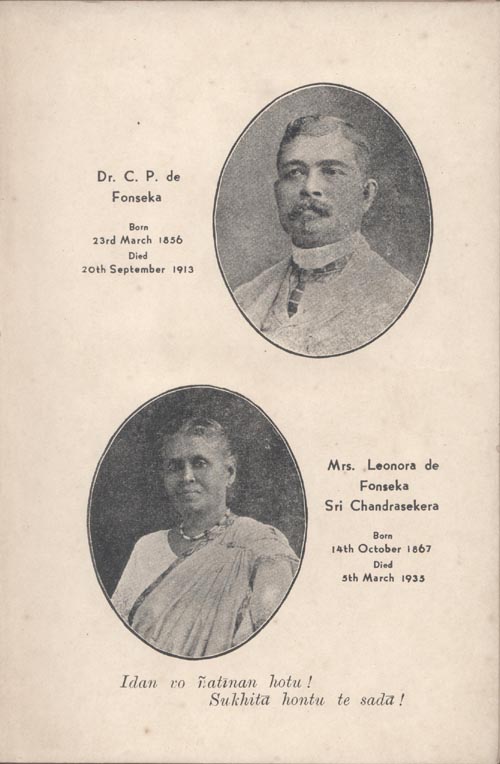 It is with sincere regret that we record the lamented death of Dr. Clarence Pedro Fonseka on the 20th September, at his residence, ” Palm Grove,” in Panadura. With unremitting and constant toil, for 23 years, he joyfully tended to the ailments that beset humanity. It was not only as a Medical Practitioner that he endeared himself to his friends and neighbours, but also as a steadfast and true friend and a generous helper of the needy and indigent. He was a wise counselor to the young, yet preserved to the last his ability to enjoy a good joke. He was indeed a joyous person, with a serene and quiet joy that nothing could disturb.
It is with sincere regret that we record the lamented death of Dr. Clarence Pedro Fonseka on the 20th September, at his residence, ” Palm Grove,” in Panadura. With unremitting and constant toil, for 23 years, he joyfully tended to the ailments that beset humanity. It was not only as a Medical Practitioner that he endeared himself to his friends and neighbours, but also as a steadfast and true friend and a generous helper of the needy and indigent. He was a wise counselor to the young, yet preserved to the last his ability to enjoy a good joke. He was indeed a joyous person, with a serene and quiet joy that nothing could disturb.
The late Dr. Fonseka was in his 58th year at the time of his demise, having been born at Moratuwa on the 23rd of March, 1856. He was educated, primarily, at St John’s, Panadura, and afterwards at St. Thomas’, Colombo. In 1876 he gained the Government Scholarship, and thereupon entered the Ceylon Medical College, and in 1881 he passed his final examination as a Licentiate of Medicine and Surgery. The late Doctor held many important positions, among which may be mentioned that of First District Surgeon at Pussellawa, in 1881; District Medical Officer at Lindula in 1883; Sub-Assistant Colonial Surgeon at Beruwela in 1888; and Sub-Assistant Colonial Surgeon and Judicial Medical Officer at Panadura in 1889. Front this last official post he retired in 1903, and enjoyed an extensive practice up to the time of his death. Dr. Fonseka was always a liberal supporter of charities and charitable institutions, and not the least of his many benefactions was the gift of a building to the Government for its outdoor dispensary at Panadura, which establishment was the means of supplying a long felt want to the public of that place. He was a member of the British Medical Association and the Agricultural Society. In 1888 he married Leonora Fernando, daughter of the late Simon Fernando Sri Chandrasekara Mudaliyar, the well-known philanthropist of Horetuduwa. He leaves behind him his sorrowing widow, four daughters and six sons; the second son being now in England studying medicine. To all of these we extend our heartfelt sympathy in their sad bereavement.
He was a Buddhist and was able to die calmly and took the great step into darkness with equanimity, convinced that he had made as good use as possible of his life here, convinced that his body which was falling again to nothing would exist again on a higher plane and assured that when life began once more it would be infinitely brighter and happier.
W. de S.
Ceylon Medical Collage Magazine, October 1913. (Page 63)